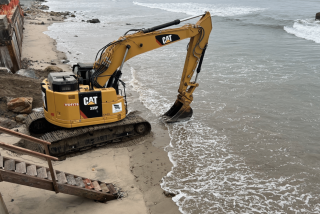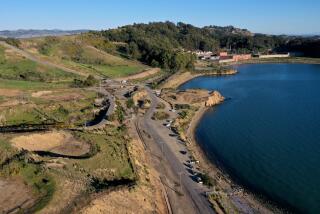Editorial: Billionaires don’t get to decide when and how Californians reach the beach
The California coastline belongs to all of us. It cannot be bought. That hasn’t stopped people from trying, however, by blocking access to the beaches near their homes. Up and down the coast, property owners are obstructing designated public paths across their properties to the beach, and they’re spending small fortunes to fight orders from the California Coastal Commission or the courts to do otherwise.
One notable beach-blocker is billionaire venture capitalist Vinod Khosla. After buying an expansive property south of Half Moon Bay in 2008, Khosla closed off a regularly used access road through it to the popular Martins Beach. Since 2009, he has battled San Mateo County officials, the Coastal Commission and the courts in his effort to keep the road closed.
Contending that there was no easement through his land, he argued that forcing him to keep the road open essentially violated his property rights. The Coastal Commission and the Surfrider Foundation, which sued him, countered that the road — the only dry land route to the beach — had been historically accessible to the public and heavily used since the 1920s. They also say that Khosla was well aware of that when he bought the property.
But last week, the gates suddenly opened. Had Khosla finally done the right thing and restored access to Martins Beach? Not exactly. His representatives told Coastal Commission officials that they would open the gates from 9 a.m. to 4:30 p.m., provided someone on the property was available to do so. Sorry, but that’s not the “maximum access” the law requires, as Coastal Commission officials have rightly pointed out. The beach — when it has been accessible — has been used to surf, fish, swim, picnic, watch the sun rise and watch it set. That means keeping the road open for longer than banking hours.
What these property owners don’t seem to understand is that the beachfront property they bought came with strings attached.
Just as troubling, Khosla appears not to have given up the fight. A state appeals court panel in August upheld a lower court’s ruling, in a suit filed by the Surfrider Foundation, that Khosla could not close the road without a permit to do so from the Coastal Commission. The appellate panel also said he had to maintain the same level of public access that existed before he bought the property. Khosla’s attorneys have petitioned the state Supreme Court to review the case; Khosla is also suing the Coastal Commission in federal court.
Meanwhile, the commission notified Khosla last month that he was violating several provisions of the Coastal Act, and that penalties were accruing at up to $11,250 a day per violation. The penalty just for blocking access to the beach for the last two and a half years comes to more than $10 million, and is still accumulating.
Khosla can afford to keep fighting, unfazed by court orders and multimillion-dollar fines. But this is a ridiculous use of his resources and, frankly, his continued resistance is an affront to the public.
Sadly, Khosla is hardly alone. He follows in the sandy footsteps of other stubborn, deep-pocketed landowners who’ve spent years fighting the Coastal Commission’s efforts to protect the public’s access to beaches. Many of them are resisting to this day; the commission has 2,373 open violation cases, about a third of which are related to access. In another high-profile case, the commission fined a doctor, Warren M. Lent, and his wife, Henny, $4.2 million in December for diverting a public easement to private use at their oceanfront property in Malibu. The couple has been tussling with the commission for nine years, and are now suing the agency.
What these property owners don’t seem to understand is that the beachfront property they bought came with strings attached: a requirement to let the public cross their property to reach the beach. That’s just the nature of living at the edge of this treasured — and public — shoreline. No less an authority than the state Constitution guarantees the public access to the coast. Either accept it or live further inland where you can completely wall off the public.
In Khosla’s case, he has said that he simply doesn’t want to maintain the access road or the amenities — like a cafe and a restroom — that were available on the beach near the road. That’s understandable, yet he has declined repeated offers from the Coastal Commission to work out an arrangement that limits his responsibility to opening the gate and minimally maintaining the road.
Khosla should accept that offer. But if he does keep fighting, so should the Coastal Commission.
Follow the Opinion section on Twitter @latimesopinion or Facebook.
More to Read
A cure for the common opinion
Get thought-provoking perspectives with our weekly newsletter.
You may occasionally receive promotional content from the Los Angeles Times.










